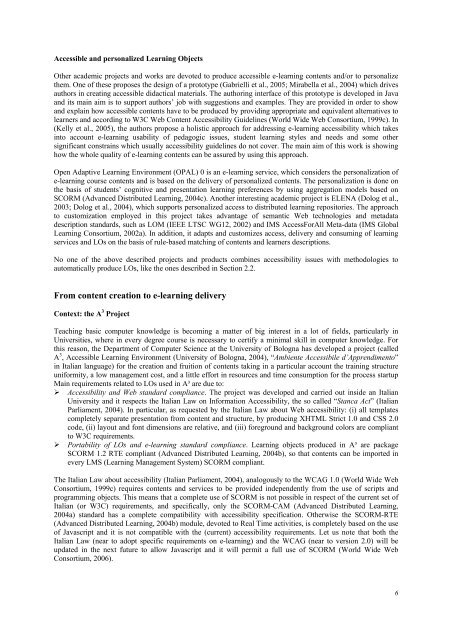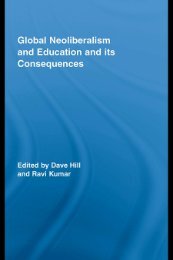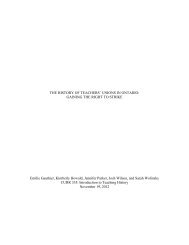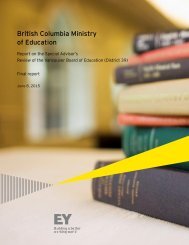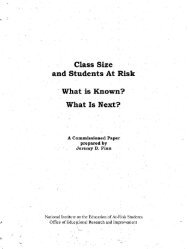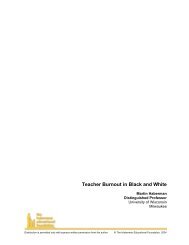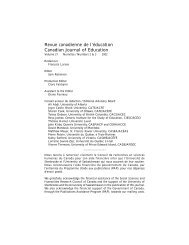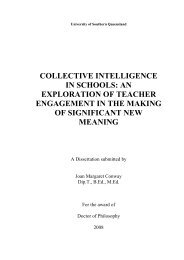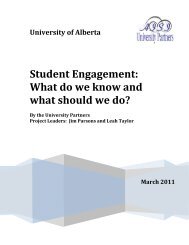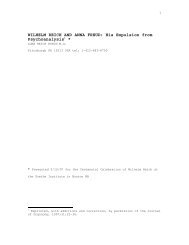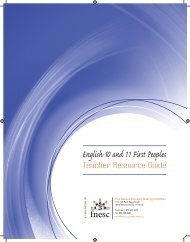October 2006 Volume 9 Number 4
October 2006 Volume 9 Number 4
October 2006 Volume 9 Number 4
You also want an ePaper? Increase the reach of your titles
YUMPU automatically turns print PDFs into web optimized ePapers that Google loves.
Accessible and personalized Learning Objects<br />
Other academic projects and works are devoted to produce accessible e-learning contents and/or to personalize<br />
them. One of these proposes the design of a prototype (Gabrielli et al., 2005; Mirabella et al., 2004) which drives<br />
authors in creating accessible didactical materials. The authoring interface of this prototype is developed in Java<br />
and its main aim is to support authors’ job with suggestions and examples. They are provided in order to show<br />
and explain how accessible contents have to be produced by providing appropriate and equivalent alternatives to<br />
learners and according to W3C Web Content Accessibility Guidelines (World Wide Web Consortium, 1999c). In<br />
(Kelly et al., 2005), the authors propose a holistic approach for addressing e-learning accessibility which takes<br />
into account e-learning usability of pedagogic issues, student learning styles and needs and some other<br />
significant constrains which usually accessibility guidelines do not cover. The main aim of this work is showing<br />
how the whole quality of e-learning contents can be assured by using this approach.<br />
Open Adaptive Learning Environment (OPAL) 0 is an e-learning service, which considers the personalization of<br />
e-learning course contents and is based on the delivery of personalized contents. The personalization is done on<br />
the basis of students’ cognitive and presentation learning preferences by using aggregation models based on<br />
SCORM (Advanced Distributed Learning, 2004c). Another interesting academic project is ELENA (Dolog et al.,<br />
2003; Dolog et al., 2004), which supports personalized access to distributed learning repositories. The approach<br />
to customization employed in this project takes advantage of semantic Web technologies and metadata<br />
description standards, such as LOM (IEEE LTSC WG12, 2002) and IMS AccessForAll Meta-data (IMS Global<br />
Learning Consortium, 2002a). In addition, it adapts and customizes access, delivery and consuming of learning<br />
services and LOs on the basis of rule-based matching of contents and learners descriptions.<br />
No one of the above described projects and products combines accessibility issues with methodologies to<br />
automatically produce LOs, like the ones described in Section 2.2.<br />
From content creation to e-learning delivery<br />
Context: the A 3 Project<br />
Teaching basic computer knowledge is becoming a matter of big interest in a lot of fields, particularly in<br />
Universities, where in every degree course is necessary to certify a minimal skill in computer knowledge. For<br />
this reason, the Department of Computer Science at the University of Bologna has developed a project (called<br />
A 3 , Accessible Learning Environment (University of Bologna, 2004), “Ambiente Accessibile d’Apprendimento”<br />
in Italian language) for the creation and fruition of contents taking in a particular account the training structure<br />
uniformity, a low management cost, and a little effort in resources and time consumption for the process startup<br />
Main requirements related to LOs used in A³ are due to:<br />
Accessibility and Web standard compliance. The project was developed and carried out inside an Italian<br />
University and it respects the Italian Law on Information Accessibility, the so called “Stanca Act” (Italian<br />
Parliament, 2004). In particular, as requested by the Italian Law about Web accessibility: (i) all templates<br />
completely separate presentation from content and structure, by producing XHTML Strict 1.0 and CSS 2.0<br />
code, (ii) layout and font dimensions are relative, and (iii) foreground and background colors are compliant<br />
to W3C requirements.<br />
Portability of LOs and e-learning standard compliance. Learning objects produced in A³ are package<br />
SCORM 1.2 RTE compliant (Advanced Distributed Learning, 2004b), so that contents can be imported in<br />
every LMS (Learning Management System) SCORM compliant.<br />
The Italian Law about accessibility (Italian Parliament, 2004), analogously to the WCAG 1.0 (World Wide Web<br />
Consortium, 1999c) requires contents and services to be provided independently from the use of scripts and<br />
programming objects. This means that a complete use of SCORM is not possible in respect of the current set of<br />
Italian (or W3C) requirements, and specifically, only the SCORM-CAM (Advanced Distributed Learning,<br />
2004a) standard has a complete compatibility with accessibility specification. Otherwise the SCORM-RTE<br />
(Advanced Distributed Learning, 2004b) module, devoted to Real Time activities, is completely based on the use<br />
of Javascript and it is not compatible with the (current) accessibility requirements. Let us note that both the<br />
Italian Law (near to adopt specific requirements on e-learning) and the WCAG (near to version 2.0) will be<br />
updated in the next future to allow Javascript and it will permit a full use of SCORM (World Wide Web<br />
Consortium, <strong>2006</strong>).<br />
6


